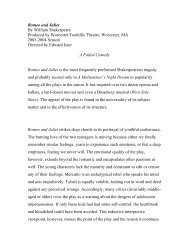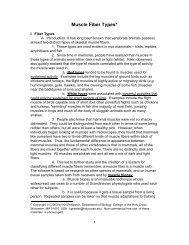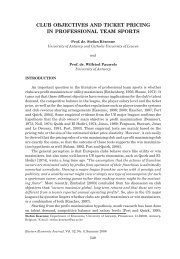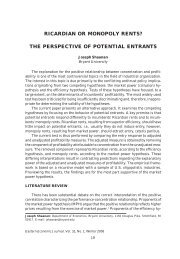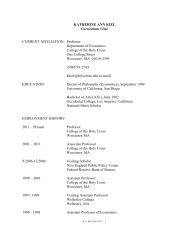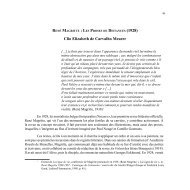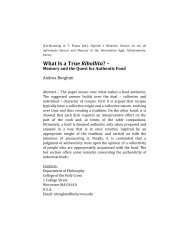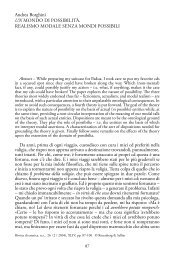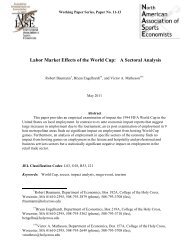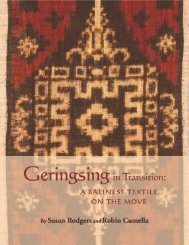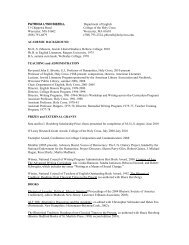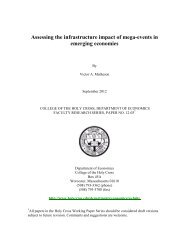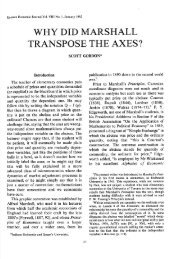29-2 Singh.pmd - College of the Holy Cross
29-2 Singh.pmd - College of the Holy Cross
29-2 Singh.pmd - College of the Holy Cross
Create successful ePaper yourself
Turn your PDF publications into a flip-book with our unique Google optimized e-Paper software.
CAPITAL ACCOUNT LIBERALIZATION<br />
197<br />
and encapsulated in his well-known “beauty contest” analogy, which highlights <strong>the</strong><br />
role <strong>of</strong> speculation in determining prices.<br />
Thus, in Keynesian analysis, which has been formalized in recent <strong>the</strong>oretical<br />
contributions, price formation in asset markets may <strong>of</strong>ten be dominated by speculators<br />
or, in modern parlance, noise traders. Moreover, <strong>the</strong>oretical work on Darwinian<br />
selection mechanisms indicate that <strong>the</strong> Friedman [1953] assertion that rational investors<br />
will always wipe out speculators is far from being valid in all situations. 7<br />
Fur<strong>the</strong>r <strong>the</strong> critical school emphasizes that financial markets are particularly<br />
prone to coordination failures and <strong>of</strong>ten generate multiple equilibria, some <strong>of</strong> which<br />
are good and some <strong>of</strong> which are bad. In <strong>the</strong> absence <strong>of</strong> appropriate coordination by<br />
<strong>the</strong> government or international authorities, an economy may languish in a low-level<br />
equilibrium, producing suboptimal output and employment levels.<br />
The post-Keynesian economists [see for example, Davidson, 2001], take a more<br />
radical stance. They put forward analyses and evidence in favor <strong>of</strong> Keynes’ <strong>the</strong>sis<br />
“that flexible exchange rates and free international capital mobility are incompatible<br />
with global full employment and rapid economic growth in an era <strong>of</strong> multilateral free<br />
trade” [ibid., 12]. These economists also challenge <strong>the</strong> orthodox presumption that<br />
transparency and availability <strong>of</strong> more information would make <strong>the</strong> financial markets<br />
less prone to crisis. They point out that <strong>the</strong> crises are fundamentally due to <strong>the</strong><br />
fact that <strong>the</strong> future is uncertain and people have different perceptions about it.<br />
Keynes was very skeptical about <strong>the</strong> ability <strong>of</strong> <strong>the</strong> world economy under free<br />
trade and free capital movements to maintain balance <strong>of</strong> payments equilibrium between<br />
countries at full employment levels <strong>of</strong> output. In a famous passage he observed,<br />
“… <strong>the</strong> problem <strong>of</strong> maintaining equilibrium in <strong>the</strong> balance <strong>of</strong> payments between<br />
countries has never been solved … <strong>the</strong> failure to solve <strong>the</strong> problem has been a<br />
major cause <strong>of</strong> impoverishment and social discontent and even <strong>of</strong> wars and revolutions<br />
… to suppose that <strong>the</strong>re exists some smoothly functioning automatic mechanism<br />
<strong>of</strong> adjustment which preserves equilibrium only if we trust to matters <strong>of</strong> laissez<br />
faire is a doctrinaire delusion which disregards <strong>the</strong> lessons <strong>of</strong> historical experience<br />
without having behind it <strong>the</strong> support <strong>of</strong> sound <strong>the</strong>ory” [Moggridge, 1980, 21-2]. Consequently<br />
<strong>the</strong> Keynesian design for <strong>the</strong> postwar international financial system did<br />
not envisage free capital movements.<br />
In summary, <strong>the</strong> orthodox <strong>the</strong>ory that financial liberalization leads to global economic<br />
efficiency based on <strong>the</strong> analogy with free trade is flawed on several counts,<br />
including some within <strong>the</strong> neoclassical tradition itself.<br />
EMPIRICAL RESEARCH ON FINANCIAL LIBERALIZATION AND<br />
ECONOMIC CRISIS<br />
Banking and Currency Crises and <strong>the</strong> Real Economy<br />
The <strong>the</strong>oretical expectation that free capital movements lead to smoo<strong>the</strong>r income<br />
and consumption trajectories for individuals and countries following economic shocks<br />
than would o<strong>the</strong>rwise be <strong>the</strong> case, has been confounded by <strong>the</strong> experience <strong>of</strong> developing<br />
countries. Substantial empirical evidence suggests a close link between <strong>the</strong> liber-



